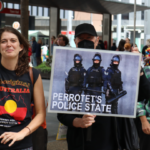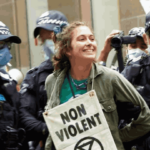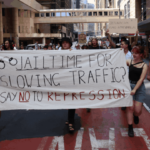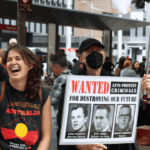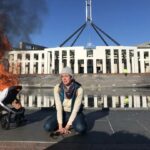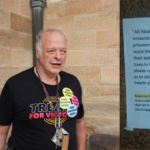Violet Coco Wins District Court Appeal, But NSW Police Continue to Target Climate Protesters
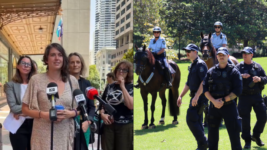
Violet Coco has had her 15 month prison sentence as well as her criminal conviction quashed by NSW District Court Judge Mark Williams, who yesterday allowed the climate defender’s appeal against severity and resentenced her to a 12 month conditional release order (CRO).
In stark contrast to the manner in which Magistrate Allison Hawkins had chastised Coco when sending her to prison in December 2022, Judge Williams considered the 32-year-old activist had posed no danger to the community, especially as evidence in that regard had been falsified by NSW police.
Coco and three other Stop Fossil Fuel Subsidies supporters blocked just one lane of traffic on the Sydney Harbour Bridge with a stationary van for 25 minutes in April last year, just weeks after the Perrottet government had enacted one of the most draconian antiprotest regimes on the planet.
The clincher for Coco came a week prior to her appeal, when, during fellow demonstrator Alan Glover’s trial over the same action, it became clear that evidence provided by NSW police regarding an ambulance on its way to an emergency that had been blocked by the protest was a falsehood.
Indeed, the false evidence is only one amongst a cornucopia of law-bending tactics NSW police has been applying to climate activists, which increasingly makes plain that state law enforcement is actively working to suppress knowledge of the climate emergency.
Bail as a form of custody
Stop Fossil Fuel Subsidies supporter Peter Edington was in the courtroom during what was a joint appeal involving both Coco and Glover on Wednesday this week, as well as at the latter’s trial last week, which involved the defence raising issue over the false assertions around an ambulance.
Edington explained that at Glover’s trial, barrister Felicity Graham provided evidence proving that the ambulance with sirens blaring was a misrepresentation on the part of NSW police, as she’d ascertained prior to proceedings that there was no such vehicle.
The bizarre aspect to the assertion around a blocked ambulance was that AM radio shock jocks and conservative politicians had been suggesting that the spike in climate protests in Sydney at the time, were particularly hazardous as they might result in this specific scenario.
Further comments made by the judge include that aerial footage of the bridge showed traffic could simply be diverted into another lane to get around the van, that the activists had made it easy for the police to remove it and that police were on the ready prior to the action taking place.
“The judge made a point of restating that there had been no ambulance and the police agreed,” Edington told Sydney Criminal Lawyers. “And he said that in Coco’s case bail was in some respect a form of custody.”
Judge Williams also found the 13 days Violet spent in Silverwater prison, after being sentenced in December, amounted to solitary confinement and her bail conditions had led to 97 days of “virtual house arrest”.
“Bail controls”
Coco’s conviction that stuck was obstructing a bridge under amended section 144G of the Roads Act 1993 (NSW), which is part of Perrottet’s extreme antiprotest regime enacted last April, following a spate of climate actions staged by Stop Fossil Fuel Subsidies and Blockade Australia the month prior.
In response to these laws and the steep sentence Coco was delivered last December, a sizable group of protesters staged a rally out the front of the Downing Centre Court on Wednesday morning, and those who spoke addressed the police targeting of climate defenders in particular.
“The police taskforces are using politicised power to maintain control over us,” said Beyond War activist educator Margaret Pestorius. “What we’ve discovered is a new system of policing.
“These police taskforces are dangerous. They draw their power from political rhetoric. They draw money from the state, and they are provided by governments with incarceration rights via bail.”
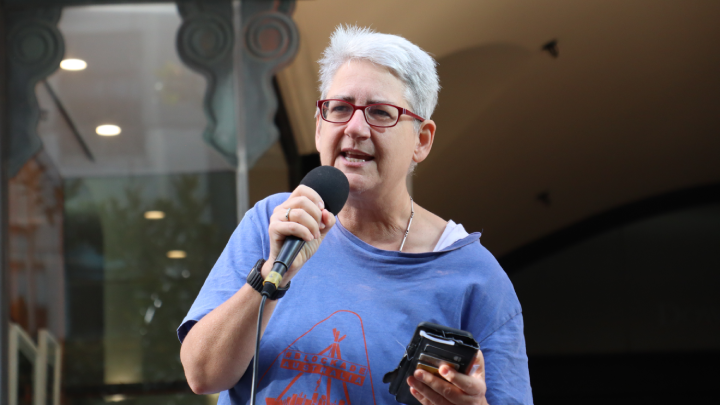
At the time of the uptick in climate actions last March, NSW police established Strike Force Guard to specifically combat the peaceful but disruptive protesters. And the unit was part of a questionable operation involving a meeting of activists on private property being surveilled and then raided.
Another key gripe, which Pestorius raised, is the use of bail conditions to punish and to prevent activists associating with others and taking part in further protests.
These sorts of “bail controls” have been raised since the Extinction Rebellion protests of the spring of 2019.
“Bail is the issue here. Not the big sentences but bail,” warned Pestorius. “These police taskforces are dangerous because they draw power from the agitating and dog whistling of the premier, with cheering from the Labor opposition.”
“We’ve got the Labor opposition in cahoots,” she added. “They’re in it together.”
“Shame on the NSW police”
On exiting the court under the terms of a CRO, Coco told reporters, “We are in a climate emergency. We are in the final hours to change the trajectory of hell on Earth. We must continue to raise the alarm on the climate and ecological emergency as loudly and boldly as possible.”
However, as has become apparent, the strongarm of the NSW government, the NSW police, is actively pursuing those who are raising this alarm in the community and trying to silence them at the behest of Macquarie Street: a situation that is obviously benefiting fossil fuel industry donors.
“We are about to see the NSW police go into the court behind, and I hope apologise and grovel to the court for lying and for lying to the people of NSW,” Senator David Shoebridge told the protesters on Wednesday morning.

Shoebridge described the ambulance scenario as a “fiction… designed to play into a political moment and justify laws.” And he added that the laws were passed to specifically silence climate defenders and then were justified by the lies regarding an ambulance.
“The political class… has decided not to deal with the root cause of the problem, not to keep coal and gas in the ground and protect our future, but to put in gaol those who stand up and demand more,” Shoebridge made clear.
“And thanks to the police for coming out in great numbers like they always do to these actions,” the senator remarked wryly. “Where are the horses?”


